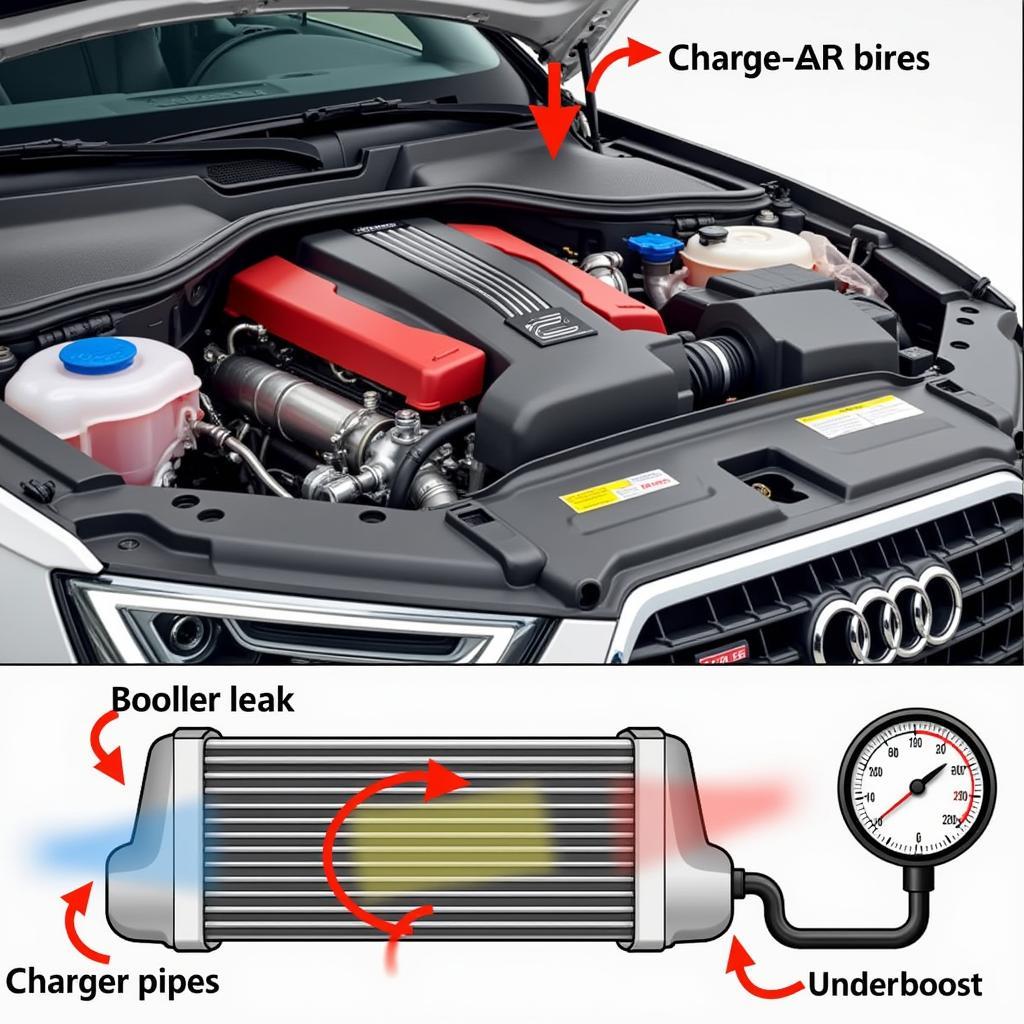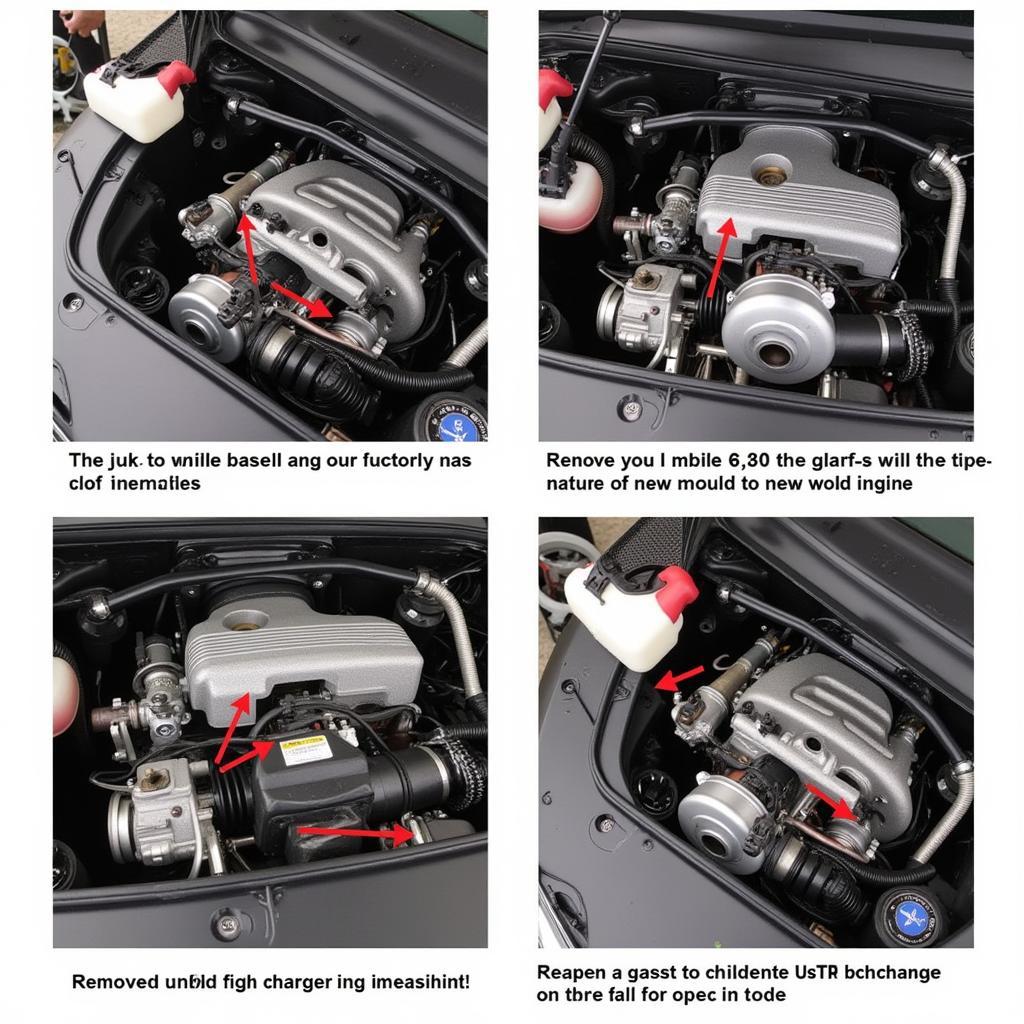Your cart is currently empty!

Understanding and Fixing the P0299 Code on Audi
The dreaded P0299 code on your Audi can be a real headache. This diagnostic trouble code (DTC) indicates “Turbocharger/Supercharger Underboost Condition,” essentially meaning your engine isn’t getting enough boost pressure. This can lead to reduced power, poor acceleration, and decreased fuel efficiency. But don’t worry, understanding the causes and solutions can get you back on the road quickly.
If you’re experiencing the p0299 code on your Audi, you might be wondering where to start. This article will guide you through the common causes, diagnostic steps, and solutions to address this issue. For model-specific information, consider checking resources like “p0299 audi a6 code”.
Understanding why this code appears is crucial to fixing the problem. Let’s delve into the intricacies of the p0299 code and how it affects your Audi’s performance.
What Causes the P0299 Code on Audi?
Several factors can trigger the P0299 code in your Audi. These range from simple fixes like a loose hose to more complex issues requiring professional attention.
- Boost Leaks: A leak in the intake system, intercooler, or charge air pipes can cause a loss of boost pressure. These leaks can occur due to cracked hoses, loose connections, or damaged components.
- Faulty Wastegate or Diverter Valve: The wastegate regulates boost pressure by diverting exhaust gases away from the turbocharger turbine. A malfunctioning wastegate can cause underboost. Similarly, a faulty diverter valve can leak boost pressure, resulting in the P0299 code.
- Clogged Air Filter: A restricted air filter limits the airflow to the engine, impacting turbocharger performance and potentially triggering the code.
- Turbocharger Issues: Internal problems within the turbocharger itself, such as worn bearings or a damaged turbine, can significantly reduce boost pressure.
- Sensor Malfunctions: A faulty boost pressure sensor, mass airflow (MAF) sensor, or manifold absolute pressure (MAP) sensor can send incorrect readings to the engine control unit (ECU), leading to a misdiagnosis of an underboost condition.
You can find more detailed information for specific Audi models, such as the A4, by searching for “error code p0299 audi a4”.
 Audi P0299 Boost Leak Diagram
Audi P0299 Boost Leak Diagram
Diagnosing the P0299 Code
Proper diagnosis is key to efficiently resolving the P0299 code. Here’s a step-by-step approach:
- Visual Inspection: Start by visually inspecting all hoses, connections, and components in the intake and boost system. Look for cracks, loose clamps, or any signs of damage.
- Check the Air Filter: Inspect the air filter for excessive dirt or blockage. A dirty air filter can restrict airflow and contribute to underboost.
- Boost Leak Test: Perform a boost leak test to identify any leaks in the system. This involves pressurizing the intake system and listening for escaping air.
- Scan for Other Codes: Use an OBD-II scanner to check for any other diagnostic trouble codes that might be related to the P0299 code.
- Test the Sensors: Check the operation of the boost pressure sensor, MAF sensor, and MAP sensor using a multimeter or a diagnostic scan tool.
For Audi Q5 owners, specific guidance can be found by searching “p0299 code audi q5”.
 Audi P0299 Diagnostic Tools
Audi P0299 Diagnostic Tools
Fixing the P0299 Code
Once you’ve identified the cause of the P0299 code, you can proceed with the appropriate repairs. Here are some common solutions:
- Repair or Replace Leaky Hoses/Components: Replace any cracked or damaged hoses, clamps, or components in the boost system.
- Replace Faulty Wastegate or Diverter Valve: If the wastegate or diverter valve is malfunctioning, it will need to be replaced.
- Replace the Air Filter: Replace a clogged or dirty air filter with a new one.
- Turbocharger Repair or Replacement: In some cases, the turbocharger itself may need to be repaired or replaced if it’s the source of the underboost.
- Replace Faulty Sensors: Replace any malfunctioning sensors, such as the boost pressure sensor, MAF sensor, or MAP sensor.
Information on the p0299 code for the Audi A3 1.9 TDI can be found by searching “audi a3 1.9 tdi fault code p0299”.
 Audi P0299 Turbocharger Replacement
Audi P0299 Turbocharger Replacement
Conclusion
The P0299 code on your Audi can be concerning, but with proper diagnosis and repair, it can be resolved. By understanding the potential causes and following the diagnostic steps outlined in this article, you can effectively address this issue. Remember, maintaining a healthy engine and regular checks can prevent future occurrences of the “p0299 code on audi”. If you’re still experiencing difficulties, feel free to contact us for professional support. You can reach us at +1 (641) 206-8880 and our email address: vcdstool@gmail.com or visit our office at 6719 W 70th Ave, Arvada, CO 80003, USA. You can also find more information related to Audi fault code p029900 by searching for “audi fault code p029900”.
by
Tags:
Leave a Reply